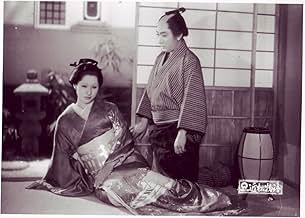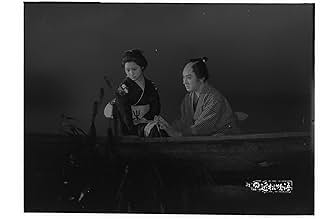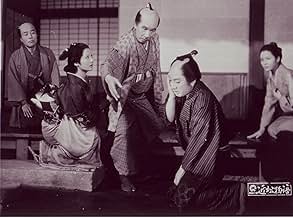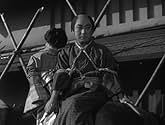NOTE IMDb
8,0/10
5,3 k
MA NOTE
Ishun est un grand imprimeur riche, mais antipathique qui a accusé à tort sa femme et son employé préféré d'être amants. Pour échapper à la punition, les accusés s'enfuient ensemble, mais Is... Tout lireIshun est un grand imprimeur riche, mais antipathique qui a accusé à tort sa femme et son employé préféré d'être amants. Pour échapper à la punition, les accusés s'enfuient ensemble, mais Ishun craint le déshonneur si cela se sait.Ishun est un grand imprimeur riche, mais antipathique qui a accusé à tort sa femme et son employé préféré d'être amants. Pour échapper à la punition, les accusés s'enfuient ensemble, mais Ishun craint le déshonneur si cela se sait.
- Réalisation
- Scénario
- Casting principal
- Récompenses
- 1 victoire et 2 nominations au total
Eitarô Ozawa
- Sukeemon
- (as Sakae Ozawa)
Avis à la une
This is certainly a good film, beautifully photographed and evocatively acted. Yet one should certainly criticize it, and Mizoguchi, for it is not without flaws and weaknesses. Mizoguchi really cared for women, and wanted to make statements on man's lack of sympathy and total cruelty, yet he sometimes gets ahead of himself in trying to make this statement by adopting the wrong means. This is certainly a case in 'the Crucified Lovers', 'Princess Yang Kwei Fei' and 'Zankiku monogatari'. He sets the scenario in feudal Japan, which leaves the viewer at the end with the partially right exclamation: "boy, does feudalism suck, I'm glad that it is over...". And true, some of the scenarios such weaker films of Mizoguchi present would be literary impossible today. Also, his women characters sometimes become archetypes of unrealistic self-sacrifice, which also simplifies the scenario less appealing. Saying that, "Crucified Lovers" is a good film, with such few relative weaknesses, though the sometimes chilly, cynical prose by Ueda, the screenwriter helps this film allot. I still highly prefer and recommend Mizoguchi's 'realistic, 'contemprary' films of 1936: 'Osaka Elegy' and 'Sisters of the Gion', as well as his late masterpieces, in which he showed more restraint and subtlety: 'Ugetsu', 'Sansho Dayu', and 'The Life of Oharu'.
The only print of CHIKAMATUS MONOGATARI I've been able to find was abysmal - I almost couldn't watch it. Which is a shame as this is among the greatest Mizoguchi films. The story - which I believe had been done before and since by other Japanese directors - is a bit straighter than my favorite Mizoguchi films (SANSHO THE BAILIFF and UGETSU MONOGATARI), and is essentially a tale of tragic romance, in this case a transgressive romance that crosses strict class boundaries. As always with Mizoguchi, there is an exquisitely expressed tone of defiance, and - bad print aside - I was very pleased. As with all of Mizoguchi's films, I'm eagerly awaiting a restored DVD release - whenever that may come...
This is adapted from a work by Chikamatsu Monzaemon, one of the defining writers from the early Tokugawa era. His name often reaches us in the contours of a Japanese Shakespeare and as usually with these Western imports to explain Eastern art, it is mostly a lazy comparison. Unlike Shakespeare who continues to inspire a steady flow of film, Chikamatsu's name has been largely neglected however; there is this, and films by Uchida, Shinoda, and Yasuzo Masumura, 'shunji'/double-suicide stories that were Chikamatsu's forte, each enlivened in its own way by the intensity of vibrant artifice and a story of forbidden passions cleansed by death.
So film-wise, the heart of these things has been extrapolated from where centuries of concentrated practice refined them, in the stages of kabuki or bunraku, both of which featured elaborate contraptions for generating illusions. The stage having been set, it was all a matter of achieving a cinematic mobility around it. Shinoda made the most clever simple use of that stage in Double Suicide; he was essentially filming what domestic audiences had enjoyed for centuries on the stage of bunraku as part of unbroken tradition, but trusting our eye to be naturally dislocated the right distance to absorb this as a puzzling modernity.
It is not unlike what has happened with Mizoguchi; a visual purity from tradition dislocated, thus obscured, through Western interpretations.
But let's backtrack a little. We know that Chikamatsu abandoned kabuki for the puppet theater of bunraku, an author's theater, with pliable actors held on strings and the gods that move the world made visible. There he worked in favour of better integrated audience manipulation, in favour of an idealized realism sprung from the author's mind.
So here we have a film about a scroll-maker, himself an artist charged with cultivating idealized images, fighting against the idealized reality he has helped cultivate in a quest for the true love he had all his life sublimated into perfect service.
It is very similar to Oharu in this way; the film structured around the tension that rises from characters performing idealized roles and the tortured heart that gives rise to them. There is a master printer who cultivates the image of the noble benefactor but who is a cruel deceiving scumbag. Nobles who act magnanimous in the open but then use their position to barter for money. The rival printer who feigns congratulations or compassion but who is secretly plotting for the imperial position.
So this idealized world that Chikamatsu advocated and in a small part helped cultivate, Mizoguchi posits to be a system of organized oppression with victims its own characters.
But it is in thrusting through this world of idealized, thus largely fictional appearances, that the two lovers can finally realize feelings that were socially prohibited. In this fictional world true beauty, a love fou, is realized by shedding the artificial. As it turns out, the two of them become the couple they were groomed to be.
As usual with Mizoguchi, the narrative on the surface level is never less than obvious. It is clean, disarmingly earnest. It seems like the film does not demand anything of us. But beneath the controlled histrionics, there is a heart of images that beats with abstract beauty.
The final image is of the two lovers publicly declaring love by simply standing together. It is again clean but resonates outsid the narrative. Their fate is sealed, but the image no longer cultivated but naturally arisen now has the chance to blossom across the audience of curious onlookers. It is an image with the power to inspire change.
Mizoguchi is not a filmmaker I can deem personal. But he's a remarkable study just the same.
So film-wise, the heart of these things has been extrapolated from where centuries of concentrated practice refined them, in the stages of kabuki or bunraku, both of which featured elaborate contraptions for generating illusions. The stage having been set, it was all a matter of achieving a cinematic mobility around it. Shinoda made the most clever simple use of that stage in Double Suicide; he was essentially filming what domestic audiences had enjoyed for centuries on the stage of bunraku as part of unbroken tradition, but trusting our eye to be naturally dislocated the right distance to absorb this as a puzzling modernity.
It is not unlike what has happened with Mizoguchi; a visual purity from tradition dislocated, thus obscured, through Western interpretations.
But let's backtrack a little. We know that Chikamatsu abandoned kabuki for the puppet theater of bunraku, an author's theater, with pliable actors held on strings and the gods that move the world made visible. There he worked in favour of better integrated audience manipulation, in favour of an idealized realism sprung from the author's mind.
So here we have a film about a scroll-maker, himself an artist charged with cultivating idealized images, fighting against the idealized reality he has helped cultivate in a quest for the true love he had all his life sublimated into perfect service.
It is very similar to Oharu in this way; the film structured around the tension that rises from characters performing idealized roles and the tortured heart that gives rise to them. There is a master printer who cultivates the image of the noble benefactor but who is a cruel deceiving scumbag. Nobles who act magnanimous in the open but then use their position to barter for money. The rival printer who feigns congratulations or compassion but who is secretly plotting for the imperial position.
So this idealized world that Chikamatsu advocated and in a small part helped cultivate, Mizoguchi posits to be a system of organized oppression with victims its own characters.
But it is in thrusting through this world of idealized, thus largely fictional appearances, that the two lovers can finally realize feelings that were socially prohibited. In this fictional world true beauty, a love fou, is realized by shedding the artificial. As it turns out, the two of them become the couple they were groomed to be.
As usual with Mizoguchi, the narrative on the surface level is never less than obvious. It is clean, disarmingly earnest. It seems like the film does not demand anything of us. But beneath the controlled histrionics, there is a heart of images that beats with abstract beauty.
The final image is of the two lovers publicly declaring love by simply standing together. It is again clean but resonates outsid the narrative. Their fate is sealed, but the image no longer cultivated but naturally arisen now has the chance to blossom across the audience of curious onlookers. It is an image with the power to inspire change.
Mizoguchi is not a filmmaker I can deem personal. But he's a remarkable study just the same.
Set in 17th century Japan, and based on a 1715 play by Chikamatsu Monzaemon (hence the title, 'A Story From Chikamatsu'), this film starts with a rich scroll-maker (Eitarō Shindō) refusing to give his wife (Kyōko Kagawa) money. When she turns to one of his top apprentices (Kazuo Hasegawa), she sets in motion of a chain of events that ultimately have them fleeing together, because the apprentice, normally a virtuous man, intended to take the money from the scroll-maker and was caught.
The story reveals emotion and desire that is both on the surface, such as the scroll-maker sexually harassing a young servant (Yōko Minamida), as well as that which is concealed. It shows us the randomness of events which may cause everything to suddenly change in one's life; as the wife puts it at one point, "Nothing is more unpredictable than a person's fate. In just one day, all of this has happened to us." If you've ever had your life flip suddenly because of love, you'll identify.
The film also shows the all-too-common fate of women; the advice given to the young servant being harassed is to "Just take it. That's the duty of an employee." Adultery is also blamed first and foremost on the women ("It's frightening what women are capable of"), and it's ominous when a couple of adulterers are being led through the town to be crucified early on in the film.
It's a solid film throughout – the cast is strong, the story is well told, and there are some gorgeous scenes, one of which is in a bamboo forest. I don't think it's going to blow you away, but it's a good one.
The story reveals emotion and desire that is both on the surface, such as the scroll-maker sexually harassing a young servant (Yōko Minamida), as well as that which is concealed. It shows us the randomness of events which may cause everything to suddenly change in one's life; as the wife puts it at one point, "Nothing is more unpredictable than a person's fate. In just one day, all of this has happened to us." If you've ever had your life flip suddenly because of love, you'll identify.
The film also shows the all-too-common fate of women; the advice given to the young servant being harassed is to "Just take it. That's the duty of an employee." Adultery is also blamed first and foremost on the women ("It's frightening what women are capable of"), and it's ominous when a couple of adulterers are being led through the town to be crucified early on in the film.
It's a solid film throughout – the cast is strong, the story is well told, and there are some gorgeous scenes, one of which is in a bamboo forest. I don't think it's going to blow you away, but it's a good one.
"Chikamatsu Monogatari" , (aka "The Crucified Lovers"), is one Mizoguchi's lesser known works and yet it is no less extraordinary for all that. It is, of course, typical of its director; another tragic tale of corrupted innocence and the terrible hand fate plays in people's lives, in this case a wrongful accusation of adultery over a very simple misunderstanding. Shakespeare could have written this.
It's set in the 17th century and it paints as relentless a picture of cruelty and hypocrisy as Mizoguchi has given us and he shoots it almost in semi-darkness, (even the exteriors take place at night or are shrouded in mist or in shadow), so there is no escape for its protagonists nor for us; the inevitability of the lovers' fate is clearly signposted from the beginning.
As the couple forced to acknowledge their love for each other by unfolding events Kazuo Hasegawa and Kyoko Kagawa are superb, particularly Kagawa whose performance as the wronged wife is a masterclass in subtlety and tenderness. This is surely one of the key films in all of Japanese cinema.
It's set in the 17th century and it paints as relentless a picture of cruelty and hypocrisy as Mizoguchi has given us and he shoots it almost in semi-darkness, (even the exteriors take place at night or are shrouded in mist or in shadow), so there is no escape for its protagonists nor for us; the inevitability of the lovers' fate is clearly signposted from the beginning.
As the couple forced to acknowledge their love for each other by unfolding events Kazuo Hasegawa and Kyoko Kagawa are superb, particularly Kagawa whose performance as the wronged wife is a masterclass in subtlety and tenderness. This is surely one of the key films in all of Japanese cinema.
Le saviez-vous
- AnecdotesThe movie is based on a play by the classic Japanese author Monzaemon Chikamatsu (1653-1725). The original title "Chikamatsu monogatari" means "A Tale From Chikamatsu".
- ConnexionsFeatured in Histoire(s) du cinéma: Toutes les histoires (1988)
Meilleurs choix
Connectez-vous pour évaluer et suivre la liste de favoris afin de recevoir des recommandations personnalisées
- How long is A Story from Chikamatsu?Alimenté par Alexa
Détails
- Date de sortie
- Pays d’origine
- Langue
- Aussi connu sous le nom de
- A Story from Chikamatsu
- Société de production
- Voir plus de crédits d'entreprise sur IMDbPro
Box-office
- Montant brut mondial
- 9 311 $US
- Durée
- 1h 42min(102 min)
- Couleur
- Rapport de forme
- 1.37 : 1
Contribuer à cette page
Suggérer une modification ou ajouter du contenu manquant






























